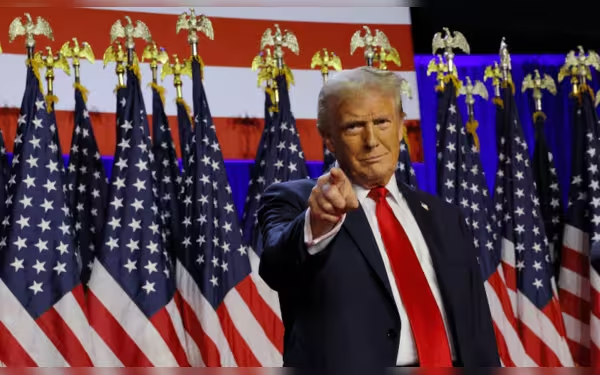Thursday, November 7, 2024 06:44 PM
Trump's Leadership Challenge: Ending Wars in Ukraine and the Middle East
- Trump's return signals a shift in U.S. politics.
- Domestic challenges include inflation and job revitalization.
- International conflicts in Ukraine and the Middle East await resolution.
 Image Credits: dawn
Image Credits: dawnAs Trump prepares for his second term, he faces challenges in Ukraine and the Middle East, impacting U.S. foreign policy and domestic issues.
As January approaches, the political landscape in the United States is set to undergo a significant transformation with Donald Trump poised to return to the White House for his second presidential term. Having successfully crossed the threshold of 270 electoral college votes, Trump’s comeback has been met with a wave of congratulations from world leaders, signaling a readiness to engage with his administration. Despite a tumultuous past marked by felony convictions and assassination attempts, Trump’s ability to galvanize support among voters, particularly in the face of high inflation, has solidified his position at the helm of American politics.
The Democratic Party's missteps, including President Joe Biden's derogatory remarks about Trump supporters, have contributed to their electoral defeat. This has led to a growing discourse around the factors that have fueled the rise of “Trumpism” and the disillusionment many Americans feel towards mainstream politicians. On the international stage, the Biden administration's unwavering support for Israel has alienated a significant portion of Arab- and Muslim-American voters, many of whom reside in crucial swing states. This demographic shift likely influenced their decision to support Trump, not necessarily out of alignment with Republican ideologies, but as a means to express dissatisfaction with the current administration.
As Trump prepares to take office, he faces the daunting task of fulfilling his promise to “make America great again.” Domestically, he must devise effective strategies to combat inflation and revitalize manufacturing jobs. However, the true test of his leadership will manifest on the global front, particularly in relation to the ongoing conflicts in Ukraine and the Middle East. Trump has boldly claimed he could resolve the Ukraine crisis in “24 hours,” while his comments about the Ukrainian president suggest a potential shift in U.S. financial support for Kyiv.
Trump's staunch support for Israel has garnered enthusiasm from the far-right factions in Israel, raising questions about how he will balance this allegiance with his commitments to Arab-American voters seeking peace in the Middle East. The internal dynamics of Trump’s support base further complicate matters, as the neoconservative wing may push for an expansion of America’s military engagements, while the America First faction advocates for a focus on domestic issues.
For Pakistan, the outlook remains uncertain. The past few American administrations have maintained a lukewarm relationship with the country, and there is little indication that this will change under Trump’s leadership. As the world watches closely, it is clear that Trump’s ability to navigate these complex international waters will be critical not only for his presidency but also for global stability.
As Donald Trump embarks on this new chapter, the stakes are high. His success in addressing both domestic challenges and international conflicts will define his legacy and shape the future of U.S. foreign policy. The coming months will reveal whether Trump can truly deliver on his promises and whether he can unite a divided nation while managing the expectations of a diverse electorate.













